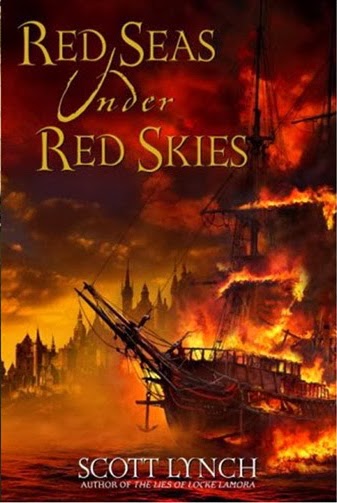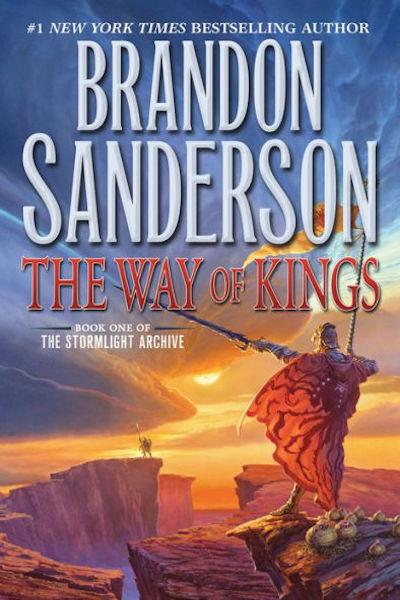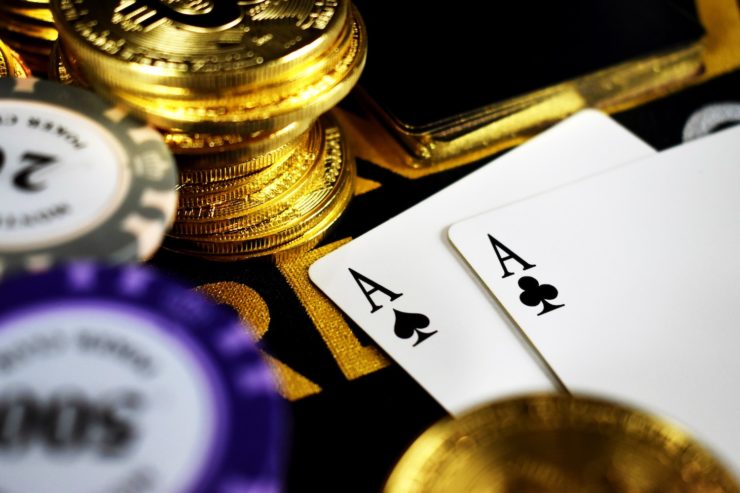Been around Tor.com a while? You might know me as the adaptation-pining, animation-loving, TV intro–exploring contributor who just surpassed 50 posts on the site (pats self on back).
You might not know that I make my living in the gambling industry. I’m not much of a gambler myself—I enjoy the occasional sports bet when I catch a game with friends, and I’ll dabble in blackjack if I’m in Vegas. Still, I write for numerous gambling-focused publications and am well versed in how the industry works.
It’s no surprise, then, when I find my ears perking up when I encounter a gambling scene in a fantasy book. Or better yet, a full-fledged casino or pleasure den portion of a fantasy town.
Today, I’ll dive into three examples and discuss the elements that ring true to me, alongside those that add a dash of fantasy to fit the story.
To be clear, there’s nothing wrong with a writer drawing inspiration from gambling and commandeering it for their own purposes. This is an imaginative genre, after all. I’m not looking for one-to-one representations of real-world gambling. Instead, I’ll look through the real-world lens to discuss what feel real about these depictions and what (if anything) feels more like fantasy.
The Gambling Industry: A Quick Primer
Generally speaking, gambling encompasses a few key sub-industries:
- Retail casinos and sportsbooks
- Online casinos (legal in six states)
- Online sports betting (legal in 24+ US markets)
- Horse racing
- Lottery
I imagine ringing and dinging slot machines or card tables are the first things to pop into your head when you think of gambling. Those locales are still very much part of the industry’s DNA—Vegas and Atlantic City remain big moneymakers.
Ask anyone in the industry, though, and you’re bound to hear about online betting first. The growth of sports betting has taken over much of the conversation, and online casinos are lagging behind, legislatively speaking. I won’t harp more on this because fantasy authors tend to use physical locations as inspiration more than, say, gambling on your phone.
The one point worth understanding is how the gambling industry sees itself. This isn’t true to a person, but there are overarching trends I’ve noticed after 10 years in the industry. In other words, please note that a lot of this is my personal opinion.
First, gambling corporations see themselves as entertainment providers first and foremost. They predictably seek to avoid the “vice” designation, steering the narrative to classify gambling as akin to paying $20 to see a movie. The unfortunate truth is that problem gamblers do exist, and there are resources available to them, many of which are legally required to be displayed on certain gambling sites.
Second, the gambling industry has historically sought to position itself as a leader in technology. That is more true now than it was five years ago, thanks to the advent of online betting in the US and big-name operators optimizing their platforms for mobile. Before any of this happened, however, gambling lagged behind more progressive technology sectors, mostly because it is so heavily regulated but also because it is a very “stuck in its ways” industry. You’re likely to find an executive uttering “we’ve always done it this way” at every gambling company. Because of this, the gambling industry constantly struggles with past perception—think Vegas mob control, peddling in vice, that sort of thing—and progressive advances on the technological front.
Finally, land-based gambling exists in a sort of purgatorial state. It struggles to bring in the younger generations due both to a lack of interest (why go to a casino when you can bet on your phone?) and the economic realities of modern-day capitalism forcing young people to be more discerning with what little disposable income they have. Many casinos are pivoting to the Las Vegas model of becoming full-fledged entertainment complexes featuring concert venues, golf courses, malls, and other add-ons.
What does this mean for fantasy? Overall, writers trend toward a more classical view of gambling. It’s oodles of fun to imagine a fantasy casino, and a few writers (as we’ll soon find) do it to great effect!
Now that you’ve got a baseline knowledge of the gambling industry, let’s look at three notable depictions of gambling in fantasy…
The Sinspire from Red Seas Under Red Skies

The Sinspire, of Scott Lynch’s Gentleman Bastard series, towers over the city of Tal Verrar and draws gamblers of all sorts to its nine floors.
Lavish. Luxurious. Rich. Vibrant. The Sinspire is everything a Vegas casino tries to be. Locke Lamora and Jean Tannen find themselves in its clutches as they attempt to rob Requin, the Sinspire’s enigmatic owner. Cue real Ocean’s 11 vibes.
My favorite aspect of the Sinspire, though, is its hierarchy. The more important you are, the more you win, the higher up in the tower you are allowed to go. The ninth floor houses only the richest and best gamblers playing the most dangerous games.
You’d be hard-pressed to find such a cut-and-dry structure in Vegas casinos, but there’s an element of truth, here. Most casinos have a high-limit room, a section cordoned off and clearly labeled, where only high-rollers should play.
Another tangentially-related reality of casinos is the way they treat high rollers. If you spend enough at a real-world casino, you might get a VIP concierge who checks in on you, provides tickets and other perks, makes reservations, and generally attends to your needs. You might even get free hotel stays or comped meals.
There might be secret rooms in casinos where only the richest of the rich are invited to play. I’m not privy to such places as an industry journalist. It’s not far-fetched to imagine those types of gambling dens being very real.
Scott Lynch got one thing completely right: casinos operate on a hierarchy, and they treat the biggest spenders best.
…Oh, did I mention the punishment for cheating in the Sinspire is death?
To my knowledge, the movies exaggerate punishments for folks who win just a bit too much. You can absolutely get thrown out, even just for making a handful of savvy picks at a casino’s sportsbook. In most cases, this comes in the form of a polite request to leave.
The games allow Lynch quite a bit of creative license. There’s one I remember that involves drinking mysterious bottles of liquid and attempting to stay cogent throughout the game. He smartly avoids the ho-hum games of real casinos (which always give the house an advantage) and gives us some magic and spectacle in Red Seas.
The Sinspire blends a perfect amount of realism with fantasy. In my experience, it’s one of the most delightful depictions of gambling in fantasy.
Jushu Davar from The Stormlight Archive

Sorry to kill the mood here, but Jushu Davar shows us the dark side of compulsive gambling. Due to his myriad problems at home (sticking to minor spoilers only here), Jushu descends into an addictive drinking and gambling spiral.
Jushu would steal from his father for gambling money. He eventually struck a relationship with Mill, a bookie, going so far as to start a hefty line of credit on his family name.
Mill’s cronies eventually went to the Davar estate to collect the debt, but Lin (the patriarch of the family) couldn’t pay it. Mill and his posse beat Jushu severely, then forced the injured man to trudge behind their carriage on foot. Shallan ends up paying a portion of the debt to free her brother.
Problem gambling is an unfortunate reality, and while there are lots of tools and resources in place, it’s still a real problem for many. What can be a hobby for some can turn into addiction.
One bright note in the real world is that gambling providers are required to provide responsible gaming resources to bettors, whether in the form of links on a website or hotline numbers displayed in physical locations. Jushu doesn’t have that luxury, so the combination of his crumbling family life and inability to get help results in his tragic descent into habitual gambling. To be clear, those who suffer from problem gambling and addiction are not at fault. The industries that benefit from such problems should be responsible for preventing and addressing these issues—sometimes, the bare minimum resources, hotlines, and links aren’t enough to actually stem the systemic problem, and individuals shouldn’t have to shoulder that burden.
Sanderson doesn’t dive too deep into the actual games on offer, which is tasteful, considering the message. It’d be really off-putting to read a description of a “fun” gambling game only to turn around and see Jushu, desperate and struggling in the face of financial ruin and worse.
Though it’s a bleak depiction, Jushu Davar’s story has some real-world grounding. The fact that his addiction takes place in a fantasy setting (the world of Roshar) only makes it worse, because he doesn’t have proper access to help or resources.
The Barrel (Ketterdam) from Six of Crows

Let’s round things out with another tragicomic heist novel centered around a band of thieves.
I’ll be real with you all: I did not like Six of Crows. It wasn’t for me. But it did have some interesting things to say about gambling, and I’ll focus on those today instead of rousing the Grishaverse fanatics out there.
Ketterdam’s gambling hub is called the Barrel. What a name. I love it. It instantly brings to mind a world of dark, alcohol-soaked locales and gives off an instant rough-and-tumble vibe.
The Barrel is split into two major sectors: East Stave, comprising mostly gambling halls operated by criminal gangs, and West Stave, where themed brothels line the streets.
Kaz Brekker opens our eyes to the Barrel, wandering its streets and picking the pockets of easy marks. It’s the exact brand of glamorous thievery you might imagine from an old-school Vegas movie. Bardugo carefully balances this criminal activity with a harrowing backstory and a heart of gold, of course.
There’s a lot to love about the Barrel if you’re looking through a real-world gambling lens. It’s home to lavish halls and ramshackle gambling dens. In that way, it’s very Vegas. For every Bellagio, you’ve got a Flamingo, almost whimsical in its old-timey ambience.
The Barrel also hosts a bustling scene of street vendors and magicians. I consider this part of the fantasy-ification of the area. While some performers on the streets of Vegas are worth stopping for—the occasional sax player, breakdancers, some singers, even—many others are just people in costumes hoping you’ll pay a few bucks to get a picture with them. No shade, it’s just not as flashy as the street magic on display in Ketterdam.
Bardugo (I assume intentionally) draws on Vegas’ very real mob history in creating Ketterdam. There was indeed a time when many of the casinos had a substantial mob influence. In the Barrel, most of the locations are run by Ketterdam’s criminal gangs. It’s the ultimate fantasy gambling pit. It pulls from real life and the fantastical nature of the genre to create a compelling and memorable location.
[Okay, I can’t resist: The reason I couldn’t fully get on board with Six of Crows is that Kaz and crew left this place for a bland icy wasteland. I pined for the seedy underbelly of the Barrel, and instead, I walked into a freezer.]
***
You’ve heard from me. Now it’s your turn: What are your favorite depictions of gambling in fantasy books? Hit me with ’em in the comments!
Cole Rush writes words. A lot of them. For the most part, you can find those words at The Quill To Live or on Twitter @ColeRush1. He voraciously reads epic fantasy and science-fiction, seeking out stories of gargantuan proportions and devouring them with a bookwormish fervor. His favorite books are: The Divine Cities Series by Robert Jackson Bennett, The Long Way To A Small, Angry Planet by Becky Chambers, and The House in the Cerulean Sea by TJ Klune.










